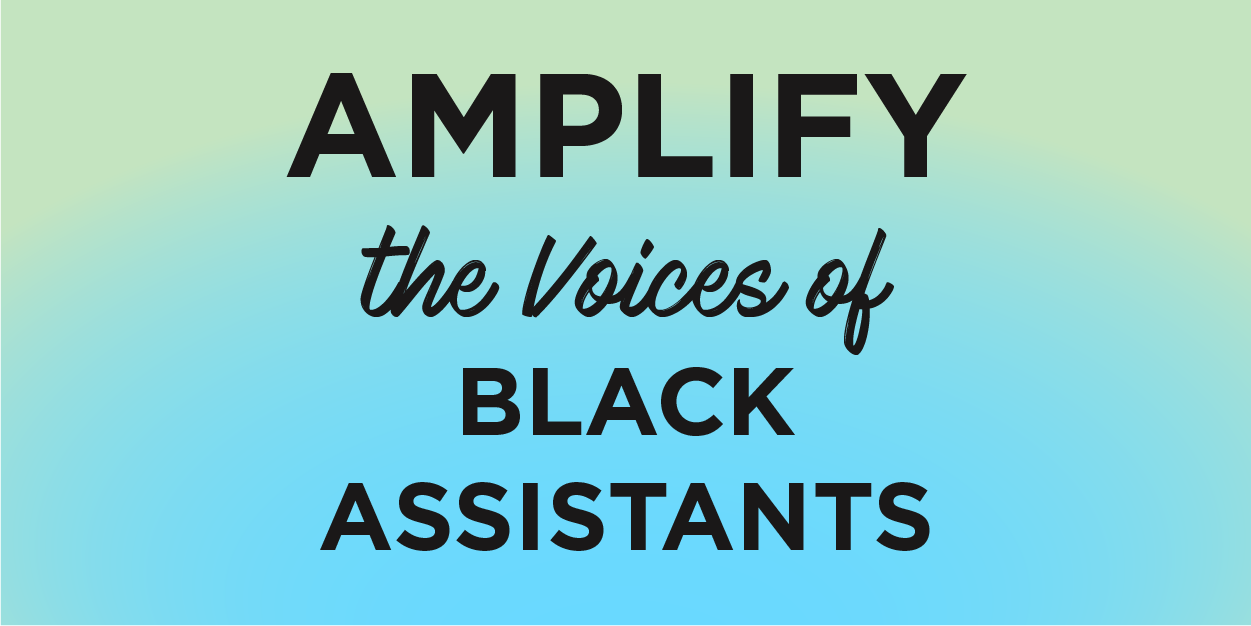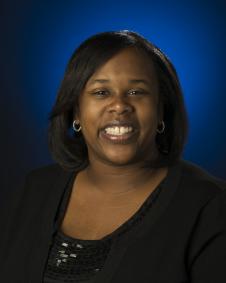Black History Month Interview Series
Meet Natalie Massey, Executive Assistant to the Deputy Administrator at NASA
Natalie Massey is an administrative professional with 12 years of experience in the role. We first met Natalie in 2019, when we were looking for EAs to participate as contributors at the ELS Forum in DC. We were beyond excited to have an executive assistant from NASA talk about her professional experience, and Natalie did not disappoint! Natalie collaborated with two other executive assistants to lead a discussion on strategies for communicating your value to leadership and expanding responsibilities. Natalie and her co-contributors compiled a takeaway document of resources, and you can download those resources here.
Let’s get to know Natalie!
Tell us some fun facts about yourself.
- My passion is writing. My Bachelor of Arts is in Communication Studies/Technical Writing.
- I have written and edited several articles for professional journals. (That’s amazing, Natalie!)
- My enjoyment comes from organizing and the process of planning. I planned my entire wedding and enjoyed every second of it. ♥️
- Wellness therapy is the best type of therapy.
What do you LOVE about your role?
To be able to mentor others and enable them to work more efficiently is humbling and gratifying. I love to help others learn and grow by teaching them best practices and solutions to be effective. As lead Executive Assistant at the National Aeronautics and Space Administration (NASA), an agency of over 17,000 employees, my level of influence is broad and impactful. With over a decade of experience as an Executive Assistant and 25 years at the agency, one must embody institutional savviness. My fellow cohorts appear to respect my opinion and the innate pulse I oftentimes have on the agency. It is surreal when I consider the level of competence and professionalism that is expected.
Tell us about a defining moment in your personal and/or professional life.
While I was serving as Executive Assistant to the Chief of Staff at NASA, I was hand-selected to leave my current position and serve as the Executive Assistant for another leader within the agency. I was qualified for this new assignment that would provide a promotion and higher level of exposure and influence. The fact that the job was personally offered to me by this individual was humbling, and I was duly excited and honored to be asked to serve.
However, after careful consideration and observation of differing reputations and how roles were played out, I decided to decline the job offer, primarily to maintain my integrity and set of values that guide my decisions.
I knew my decision could be at the risk of my career and any further mobility at the agency.
To control the narrative and take charge of my career, I ensured honest communication by privately meeting with the individual, in hopes that it would strengthen the relationship – even while turning down the opportunity. At the outset, I expressed my appreciation and provided that the position was not the right fit and my current relationships and loyalties were needed at the agency. To avoid alienating others, I maintained my professionalism and avoided speaking about the position or run the risk of alienating others in the agency. As it turns out, a few months later, I applied to be Executive Officer in a newly established organization and served in that capacity for three years. Thereafter, I re-joined the Office of the Administrator at the request of the Chief of Staff to serve in my current role as Executive Assistant to the Deputy Administrator under a different Presidential administration.
Jobs come and go and come back again. It is your integrity and honesty that stay as a constant.
What are you most proud of in your career?
Being recognized, valued, and trusted for my talents and competencies, manifested by the opportunities I have been given, provides me a source of satisfaction. It is truly humbling to be sought out and asked to serve in a prestigious position as Executive Assistant to the Deputy Administrator. In this position, I can keep a “pulse” of the agency, while reinforcing positive directions we want to take it. This effort revolves around good relationships with others at all levels.
One noteworthy accomplishment was leading the development of a workshop, “Navigating Change and Transition,” which I customized to 30 NASA administrative support professionals, civilians and contractors. The workshop delivered on transformative change and how to navigate effectively through transition, incorporating the Deputy Administrator, who chose to volunteer as a guest speaker. The Deputy Administrator’s contribution, the robust curriculum, the organization, and delivery contributed to making it a success. A number of follow-up workshops were sought after I completed this effort.
What is the best career advice you’ve received? What is your favorite piece of advice to give?
Former Deputy Administrator James Morhard stated to me, “You cannot work any harder than you do to be seen.”
This sage advice among many others was given as I directly served as his Executive Assistant. The quality of your work coupled with strong ethics and integrity are immeasurable and timeless. Although not always recognized, it remains boundless and impactful.
“The career ladder is not always an upward streak; there are crooks, turns, and deviations that occur and appear to alter our path. Those are the defining moments in one’s career.”
This advice came from a fellow staff member when I served as a Program Support Assistant in the Office of Public Affairs. At the time, I was considering whether to apply to be a Secretary in the Office of the Director at a NASA center. Although the position felt like a demotion to me, I was personally asked to apply. Currently happy and fulfilled in the Office of Public Affairs and working in the industry I was professionally trained and had a degree in, I applied for the secretary position, served two years, and one day, received an inquiry from the agency Chief of Staff to apply to be his direct Executive Assistant. This started my career trajectory at the agency level.
I advise others to influence from where you sit.
You may be aspiring to your dream job, but do not undermine the value and worth you bring in your current position. In the case of a secretary aspiring for upward mobility, note that Executive Assistants have moved beyond secretarial and clerical duties by engaging in a partner-like role with their executive. The impact you exhibit on organizational outcomes is due to your level of influence on executive decision-making. Partner with your executives and have meaningful conversations to ensure alignment on business practices and goal achievement. In whatever role you serve, provide sound guidance and counsel in matters both great and small. You will fundamentally become a key resource in the organization.
At ELS, the role of the executive assistant has been described as the culture carrier. What are some of the pressures of having to be a culture carrier and a person of color that leaders don’t even realize?
As a culture carrier, I critically analyze the decisions my agency makes. Working in the space industry and federal government, I question, are we taking enough risk or being conservative? Are we reactionary or proactively fulfilling our objectives? With the current social unrest, there is increased pressure in being a culture carrier at the agency and being Black. Navigating how the agency properly responds in the midst of the social climate is a high priority. If you align with the culture, it is quite easy. If not, you find you are continuously swimming against the current. You will quickly see what fits and what does not. Your job is no longer a series of daily tasks, but an extension and expression of your personal values and goals. The truth is you will find conflict if you work in a culture you do not agree with. But you are also able to influence the leadership if you have already established that trust. When George Floyd was murdered, the Deputy Administrator asked for my counsel on how we move forward as an agency. It was a critical time for all involved and the result was many town hall discussions that brought us more together, and a change in our core values to include “Inclusion.”
Is there a specific Black leader who inspires you? What do you admire about this individual and is there a quote you’d like to share?
Former First Lady Michelle Obama is one of the most inspirational women of our time. Among many fine qualities, one that stands out is her determined spirit. In her memoir “Becoming,” there are several instances where she discusses overcoming challenges. She becomes obsessed and a self-advocate. I am encouraged by her fortitude and dominance to overcome.
“Whether you come from a council estate or a country estate, your success will be determined by your own confidence and fortitude.” -Michelle Obama
“One of the lessons that I grew up with was to always stay true to yourself and never let what somebody else says distract you from your goals.” -Michelle Obama
Is there a Black writer, podcast host, Black-owned business, or something else you’d like to spotlight?
I encourage all to listen to The Michelle Obama podcast on Spotify where she takes a deep dive into important topics with loved ones – family, friends, and colleagues – on the relationships in our lives that shape who we are.
What do you want others to know or remember as they celebrate Black History Month?
February is all of our history and a time to shine and reflect, learn from times past, to gain a better outlook for the future of our community as well as for personal development. Black History Month can help us all to remember to not sit and watch future generations disappear. That is not an option. It will take action and fortitude. We must be a positive influence on others, determined in our efforts to build up a solid foundation for all humankind.




